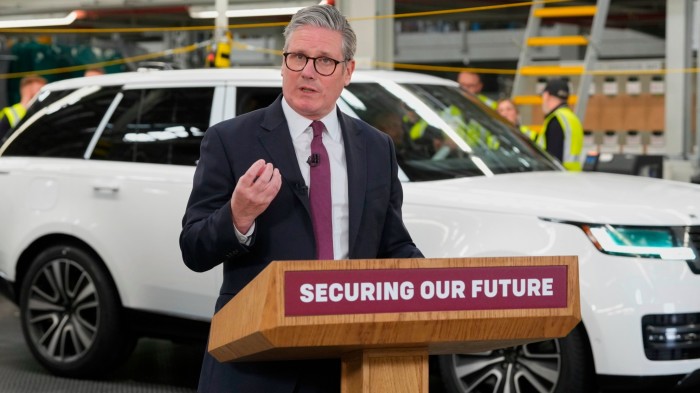Sir Keir Starmer has insisted he will not put up key taxes even if Donald Trump’s global trade war blows a hole in Britain’s public finances, as he vowed to prepare the country for “an era of global instability”.
The UK prime minister warned that Trump had thrown the global order up in the air but said he would not add to voters’ insecurity by putting up their personal taxes.
Asked if he would stick to Labour’s manifesto pledge not to raise income tax, value added tax or national insurance contributions, Starmer said: “That’s a commitment we made and a commitment we will keep.”
The government has increased employer NICs by £25bn — a rise that took effect this month — adding to sensitivity on the subject for Starmer.
The prime minister was speaking at a Jaguar Land Rover plant in the West Midlands where he insisted he would “seize the opportunity” thrown up by Trump’s imposition of sweeping tariffs to make Britain’s economy more secure.
His comments came as global equity markets continued to sell off for the third day. The FTSE 100 fell 4 per cent on Monday and is down nearly 10 per cent since last week.
Starmer was joined by Rachel Reeves, chancellor, who said she would “double down on economic security”, pointing to her decision to stick to her fiscal rules in her recent Spring Statement “even when they were tested”.
Downing Street said the fiscal rules were “iron clad” and Reeves said: “When Britain talks about economic security, we really mean it.”
Trump’s global tariff regime — including a 10 per cent levy on the UK — are likely to hit UK growth hard this year. The mean UK GDP forecast for 2025 from six analysts since April 2 is 0.7 per cent, down from a 1.2 per cent forecast in January.
Starmer said that Trump’s decision to increase tariffs posed “a huge challenge for our future” but vowed to “shelter British business from the storm” with a more active industrial policy. “This is not a passing phase,” he warned.
He confirmed that the government would add more flexibility to electric vehicle sales targets for the car industry but stuck to a 2030 ban on the sale of new petrol and diesel cars. Trump has imposed a 25 per cent tariff on all foreign-made cars entering the US.
Starmer has also promised to deliver a modern industrial strategy in the coming months, but some are sceptical about whether it will rise to the size of the challenge to Britain’s prosperity outlined by the prime minister.
One centrist Labour MP told the Financial Times: “Globalisation as we know it has come to an end and we’re fiddling around with electric car rules.” A government adviser said: “I think you can safely say at the moment that the industrial strategy is a complete red herring.”
Reeves and Starmer are trying to complete the industrial strategy — which focuses on eight key “growth sectors” — while at the same time carrying out a tough review of public spending. Both are due to conclude in June.
One Labour official said: “How can departments prepare for the industrial strategy when they don’t know if they’ll have the money to pay for it?”
However, Starmer’s aides insist that the Trump trade war is an “opportunity” for the government to accelerate its industrial strategy and to show “there’s a different way of approaching things”.
They argue that deregulation, skills and migration policy are all being informed by the industrial strategy, which they say is not just about financial support for affected sectors.
Starmer also spoke about the need to boost trade with other parts of the world including the EU, raising hopes in some quarters that they might adopt a more ambitious approach to “reset” talks in the coming weeks.
Reeves is among the ministers who want to take political risks to lower trade barriers ahead of an EU-UK summit on May 19. “I sincerely hope so,” said one minister.
Starmer has held talks with EU leaders in recent days including Ursula von der Leyen, European Commission president, and Friedrich Merz, Germany’s chancellor-in-waiting, to discuss the new trading landscape.
“There’s certainly a greater sense of urgency around the reset,” said one EU official. However, another EU diplomat said there were no new proposals yet from the UK side and Downing Street insisted Britain would not be rejoining the customs union or single market.
Separately Jonathan Reynolds, business and trade secretary, met Nick Baird, head of the Trade Remedies Authority, to discuss the UK’s trade defence measures in the event that Trump’s US tariffs lead to third countries diverting cheap goods on to the British market.
Downing Street said: “We will analyse the situation and take a pragmatic approach.” Starmer’s spokesman added: “We stand ready to respond as necessary.”
The potential closure of British Steel’s Scunthorpe steelworks is another problem facing Starmer in the immediate term, and one to which he has promised to respond with “active government”.
On Monday he did not rule out nationalising the plant, declaring that “all options are on the table” in the wake of the “extremely worrying” situation engulfing its future.
British Steel, owned by China’s Jingye Group, told workers last month that it would start consultations on job losses, putting at risk between 2,000 and 2,700 jobs at Scunthorpe.
Unions have warned that British Steel’s operations could run out of raw materials for the furnaces as early as June.
Business minister Sarah Jones told the House of Commons the government would “make sure support is in place for as long as possible”.
But she added that “the best way forward is for British Steel to continue as a commercially run business, with private investment, and government acting in support”.
Jones said Jingye had turned down the government’s latest offer of support, but added she and Reynolds were meeting the company again later this week.
Additional reporting by Valentina Romei


